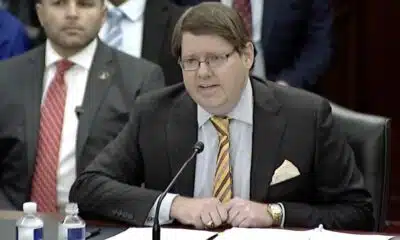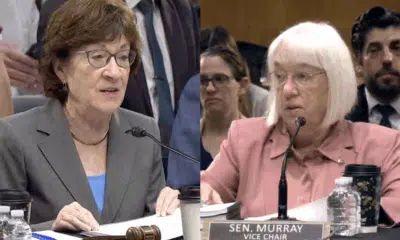News from the South - Missouri News Feed
Few changes made in $48B state budget during Missouri House debate
by Rudi Keller, Missouri Independent
April 1, 2025
Democrats failed on Tuesday to win major changes in the $47.9 billion state budget plan during Missouri House debate, suffering defeat on proposals to shift money to the school funding formula and increase payments to child care providers.
Few Republicans broke ranks with party leadership on those or any other proposal put forth by Democrats, leading one lawmaker to wonder out loud why the chamber was bothering with debates.
“Why take us through this dog and pony show?” said state Rep. Marlene Terry, a Democrat from Bellefontaine Neighbors.
Need to get in touch?
Have a news tip?
Democrats did win a few minor changes to the budget, but the biggest difference between the plan approved in the House Budget Committee last month and the bills given first round approval Monday were made by Republican amendments. In the Medicaid program, for example, the House cut about $50 million in general revenue matches to federal funds, arguing the funds were not needed because enrollment is not meeting earlier expectations.
A final series of votes on the 13 spending bills funding state operations will be held Thursday to send the budget to the state Senate. Three more bills, allocating money to capital improvements, are awaiting action in the House Budget Committee.
While the House worked on the budget, the state Senate debated a bill exempting long-term capital gains from state income tax. Senate Appropriations Committee Chairman Lincoln Hough, a Republican from Springfield, said during debate that federal budget cuts could force Missouri to spend more state tax dollars on Medicaid.
Hough questioned whether a tax cut of about $335 million in the coming fiscal year was prudent. If the federal match rate for low-income adults added to the rolls since 2021 is changed from 90% to 80%, Hough said, it would require $300 million in additional general revenue.
“That is a fairly scary financial forecast,” Hough said.
Hough has said he intends to use cash balances to fully fund the foundation formula and that he will support the increase for child care providers.
The possibility of cuts in national spending — federal funds provide about 45% of Missouri’s budget — was also raised in the House.
“Our entire budget will be blown to bits if we lose federal funding,” said state Rep. Stephanie Hein, a Democrat from Springfield.
The state had a substantial balance of $3.8 billion in the general revenue fund as of Monday, down from historic high of about $5.7 billion set in 2023. The budget for the coming year anticipates leaving about $1.9 billion unspent.
Missouri received $13.4 billion in general revenue in the year that ended June 30 and the budget anticipates $13.5 billion for the coming fiscal year.
The budget plan debated by the House cuts almost $800 million in general revenue and $2.1 billion overall less than the operating budget proposed by Gov. Mike Kehoe in January. The spending proposal achieves those savings in part by cutting appropriations that had no funding available, by reducing Medicaid to match expected enrollment and by slicing Kehoe’s plan for state employee pay raises in half.
Instead of a raise of 1% for every two years in a state job, capped at 10%, the House pay plan is to provide a raise of 1% for every two years in a state job but capped at 5%.
Additions to the budget proposed by Kehoe include 105 earmarked items, including nine added Monday, with a total cost of $170 million. The House also added $28 million that will be distributed to state colleges and universities for deferred building maintenance.
The two biggest clashes of the day bookended the five-hour debate.
Only one Republican joined Democrats on a failed amendment to shift $50 million in general revenue from a tax credit program supporting private school tuition scholarships to the foundation formula.
Democrats argued that the budget shortchanges public schools by failing to meet the new state adequacy target, which is a measure of how much high-performing districts spend per student. The House plan allows for a state adequacy target of $6,760 per student instead of the $7,145 that resulted from the calculation mandated by state law.
To boost foundation formula funding, state Rep. Betsy Fogle, a Springfield Democrat, tried to strip out $50 million for the MOScholars program, which was supposed to be funded by donations tied to tax credits.
Too many of the private schools participating in the scholarship program won’t accept students with developmental disabilities or who won’t participate in religious instruction, Fogle said.
“I can’t think of anything more frustrating to me, personally, than my tax dollars going to a school that wouldn’t have educated me, that wouldn’t have educated a lot of people in this body,” she said.
Defending the set-aside for the scholarship program, Republicans said the influx of state cash will help hundreds more students.
“This is a historic investment in our children’s future, fostering flexibility around parental involvement and educational freedom for our kids,” said state Rep. Ben Baker, a Republican from Neosho.
While the budget plan accepted Kehoe’s proposal for scholarships, it did not include his $107 million plan for child care subsidies. The system for delivering payments has been plagued by mistakes and delays and some providers have closed as a result.
Hein sought to restore about $85 million of the cut.
“We have the opportunity to fix the situation and bring the state into compliance with federal rules,” Hein said. “We can stabilize the child care industry and help our workforce.”
Republicans, however, said the expense will have to be paid from general revenue in the future and it is too costly. The problems with the payment system are solved, said House Budget Committee Chairman Dirk Deaton, a Republican from Noel, and a change now could cause problems to resurface.
“Changing how you pay providers from attendance to enrollment is not just flipping a switch over at the Department of Elementary Secondary Education,” he said. “There are substantial software changes that have to be made.”
YOU MAKE OUR WORK POSSIBLE.
Missouri Independent is part of States Newsroom, a nonprofit news network supported by grants and a coalition of donors as a 501c(3) public charity. Missouri Independent maintains editorial independence. Contact Editor Jason Hancock for questions: info@missouriindependent.com.
The post Few changes made in $48B state budget during Missouri House debate appeared first on missouriindependent.com
News from the South - Missouri News Feed
Kansas seeks death penalty in Wyandotte County deputy killing. Here’s how it works
SUMMARY: Shawn Harris faces capital murder charges for the July 26 shooting death of Wyandotte County Deputy Elijah Ming in Kansas City, Mo. The State of Kansas intends to seek the death penalty if Harris is convicted. Deputy Ming responded after a woman requested police help because Harris threatened her with a gun. Harris shot at the deputy and an officer, leading to a standoff before his surrender. Harris, with a lengthy criminal record, is held on \$2 million bond and represented by the Kansas Death Penalty Unit. Kansas reinstated the death penalty in 1994, but no executions have occurred since 1965.
The post Kansas seeks death penalty in Wyandotte County deputy killing. Here's how it works appeared first on fox4kc.com
News from the South - Missouri News Feed
Get 50% off teeth whitening with Power Swabs!
SUMMARY: Power Swabs offers a revolutionary teeth whitening system that removes stains from coffee, tea, wine, and smoking in under 5 minutes with no sensitivity. This easy two-step process uses stain-removal swabs followed by whitening swabs, hydrating enamel and lightening teeth by an average of two shades per use. Results improve over seven days and can last up to six months. Unlike strips, Power Swabs works on natural and artificial dental surfaces such as crowns and veneers, restoring their appearance. Users praise its quick, effective, and gentle treatment. A special 50% off offer is currently available with free shipping and a bonus whitening pen.
SPONSORED – Get your smile bright and ready this summer! Lifestyle consultant Scott DeFalco talks with us about a very effective teeth-whitening product called “Power Swabs.” Studies show whiter teeth take years off your appearance and make people more attractive.
With Power Swabs, there is no big-time commitment because it takes just five minutes a day. Station viewers can get a special offer by calling or going online to get 50% off with free shipping and a free quick stick pen.
Call 800-733-0477 or visit Powerswabs.com
Sponsored content disclaimer: The information and advice displayed in this story are those of individual sponsors or guests and not Nexstar Media Group, Inc.
News from the South - Missouri News Feed
Jail accused of altering records after lock-up turns fatal
SUMMARY: Angela Brown, 55, died in 2022 just two days after being arrested for shoplifting and held at the St. Louis County Jail. Her mother, Brenda Gray, alleges the jail covered up the circumstances surrounding Angela’s death, claiming officials falsified medical records and destroyed evidence. Angela was reportedly suffering from opiate withdrawal and requested an IV, which she never received. Jail staff later claimed she refused treatment, but patient refusal forms appear unsigned and were backdated before being sent to Brenda. The family is now suing the county to uncover the truth, with further court action expected soon.
Angela Brown, 55, died in 2022, just two days after being arrested on a shoplifting charge. Her mother, Brenda Gray, is now suing …
-
News from the South - Texas News Feed6 days ago
Rural Texas uses THC for health and economy
-
Mississippi Today2 days ago
After 30 years in prison, Mississippi woman dies from cancer she says was preventable
-
News from the South - Louisiana News Feed7 days ago
‘Half-baked’ USDA relocation irritates members of both parties on Senate Ag panel
-
News from the South - Alabama News Feed6 days ago
Decision to unfreeze migrant education money comes too late for some kids
-
News from the South - Georgia News Feed4 days ago
Woman charged after boy in state’s custody dies in hot car
-
Mississippi Today6 days ago
They own the house. Why won’t they cut the grass?
-
News from the South - Arkansas News Feed6 days ago
Trump’s big proposed cuts to health and education spending rebuffed by US Senate panel
-
News from the South - Georgia News Feed7 days ago
Bookman: Burt Jones’ pledge to eliminate Georgia’s income tax is wrong-headed










































